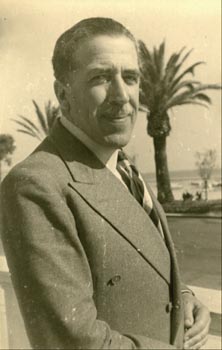Edward Hindle
Eminent biologist and zoologist who introduced
the golden hamster to the UK, Professor Edward
Hindle, completed the Diploma in Chemistry &
Dyeing at Bradford Technical College in 1903.
 Classes at Bradford Technical College set Edward
Hindle on the path of a prestigious career which
saw him travelling the world. A Bradford City
Council Exhibition holder, he passed the College
Diploma in Chemistry & Dyeing and won first
place in a National Scholarship in Biology at South
Kensington.
Classes at Bradford Technical College set Edward
Hindle on the path of a prestigious career which
saw him travelling the world. A Bradford City
Council Exhibition holder, he passed the College
Diploma in Chemistry & Dyeing and won first
place in a National Scholarship in Biology at South
Kensington.
After 3 years at the Royal College of Science
and then King’s College in London, he achieved
his Associate in Zoology in 1906. He became
a Research Assistant at the School of Tropical
Medicine in Liverpool in 1907 and the following
year worked at a marine biological station before
research at the University of California. He was
awarded his PhD in 1910. Apart from the summer
of 1911, when he studied at the Institut Pasteur
in Paris, he undertook research and study in
Cambridge, gaining a BA in 1912 and an MA in
1917, and years later in 1929, he was awarded
a DSc.
His career was interrupted by WWI and he served
with the Royal Engineers Signals Service in France
and Palestine. After the war he travelled widely in
various high profile posts overseas, interspersed
with prestigious research positions in London,
specialising in tropical medicine, and undertaking
research in in protozoology and parasitology,
particularly insect-transmitted infections. He spent
5 years as Professor of Biology and Parasitology
at the Cairo School of Medicine, followed by a
year at the London School of Hygiene & Tropical
Medicine; 3 years with the Royal Society’s Kalaazar
Commission in China preceded 5 years
as Research Fellow in Tropical Medicine at the
Wellcome Bureau of Scientific Research in London.
He was Regius Professor of Zoology at the
University of Glasgow from 1935 until 1944,
founding and becoming President of the
Zoological Society of Glasgow during this period.
He then became Scientific Director at the
Zoological Society of London from 1944 to 1951.
He was a Fellow of the Royal Society, made a
Freeman of the City of London, and he held
executive positions in a number of distinguished
societies, including General Secretary of the British
Association for the Advancement of Science,
Founder and First President of the Institute of
Biology, and Honorary Secretary of the Royal
Geographical Association.
He received the first pair of golden hamsters from
Syria and retained a lifelong interest in them,
writing the foreword to Jean Cook’s Hamster
Guidance in 1948.
Professor Edward Hindle died in January 1973.
Photograph supplied by the University of Glasgow